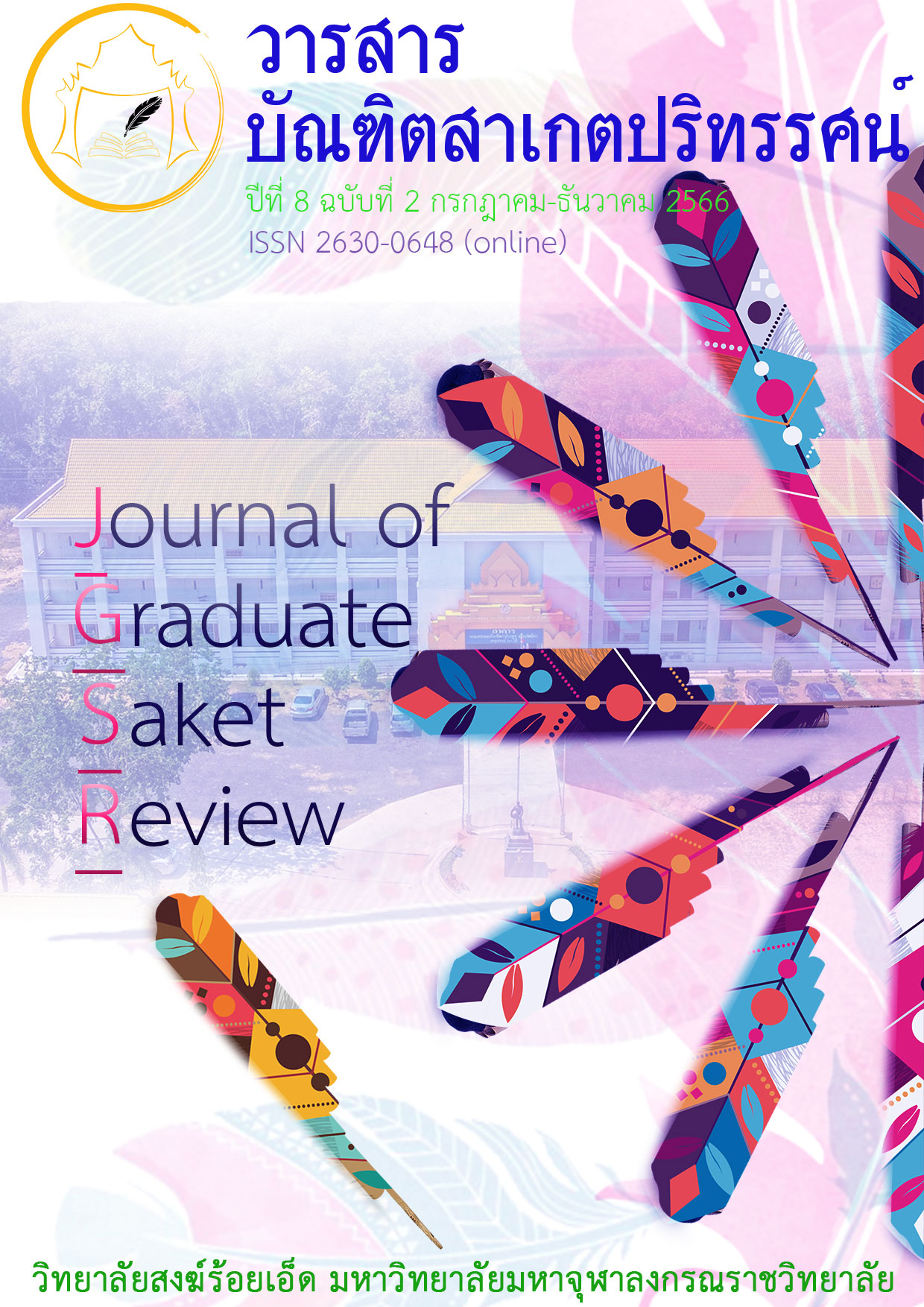The academic administration by the principle of four sangahavathu for the administrators under the office of loei primary educational service area 2
Main Article Content
Abstract
The objectives of this research were: 1) to study the condition of academic administration of educational institute administrators; 2) to study academic administration according to the Four Sangahavatthu principles of educational institute administrators; 3) to study the academic administration guidelines according to the Four Sangahavatthu of administrators of educational institutions under the Office of Loei Primary Education Service Area 2. The sample group used in the research consisted of 320 participants and five key informants. The statistics used for data analysis were: Frequency, Percentage, Mean and Standard Deviation, together with document analysis.
The research results were as follows:
1) The educational institute administrators and teachers had overall opinions on the condition of academic administration of educational institution administrators under the Office of Loei Primary Education Service Area 2 at a high level. The highest mean value was seen in the aspect of ‘educational institutions curriculum development’ followed by ‘the development of learning processes’, ‘evaluation of academic performance’, ‘education supervision and media development’, and ‘innovation and educational technology’.
2) The educational institute administrators and teachers had overall opinions on academic administration according to the Four Sangahavatthu principles of educational
institution administrators under the office of Loei Primary Education Service Area 2 at a high level. The highest mean value was seen in the aspect of Samanattata, followed by Atthacariya, Dana and Piyavaca.
3) The guidelines for academic administration according to the Four Saagahavatthu principles of educational institute administrators under the Office of Loei Primary Education Service Area 2 suggested that educational institute administrators should provide assistance in their work, promote and support in academic planning of educational institutions, have generosity, not speak sarcastic words or profanity. They should explain their reasons and say “thank you” when the joint mission has been accomplished. They should be willing and ready to listen to problems and give advice. They should have self-improvement in education and perform duties strictly, rigorously, on time and be a good role model. They should have good human relations to advise and promote subordinates in valuable things, be impartial and fair and listen to criticism and suggestions from subordinates.
Article Details

This work is licensed under a Creative Commons Attribution-NonCommercial-NoDerivatives 4.0 International License.
เนื้อหาและข้อมูลในบทความที่ลงตีพิมพ์ในวารสารบัณฑิตสาเกตปริทรรศน์ ถือเป็นข้อคิดเห็นและความรับผิดชอบของผู้เขียนบทความโดยตรงซึ่งกองบรรณาธิการวารสาร ไม่จำเป็นต้องเห็นด้วย หรือร่วมรับผิดชอบใด ๆบทความ ข้อมูล เนื้อหา รูปภาพ ฯลฯ ที่ได้รับการตีพิมพ์ในวารสารบัณฑิตสาเกตปริทรรศน์ ถือเป็นลิขสิทธิ์ของวารสารบัณฑิตสาเกตปริทรรศน์ หากบุคคลหรือหน่วยงานใดต้องการนำทั้งหมดหรือส่วนหนึ่งส่วนใดไปเผยแพร่ต่อหรือเพื่อกระทำการใด ๆ จะต้องได้รับอนุญาตเป็นลายลักอักษรจากวารสารบัณฑิตสาเกตปริทรรศน์ ก่อนเท่านั้น
References
จตุพร ศรีลานคร และคณะ. (2564). การบริหารงานบุคลากรตามหลักสังคหวัตถุ 4 ของผู้บริหารสถานศึกษาสังกัดสำนักงานส่งเสริมการศึกษานอกระบบและการศึกษาตามอัธยาศัยจังหวัดร้อยเอ็ด. วารสารมหาวิทยาลัยมหามกุฏราชวิทยาลัย วิทยาเขตร้อยเอ็ด. 10(1), 2-18.
นิภาพร เหล่าพรมมา. (2556). การบริหารบุคลากรทางการศึกษาตามหลักสังคหวัตถุ 4 ของผู้บริหารโรงเรียนพระปริยัติธรรมแผนกสามัญศึกษา กลุ่มที่ 7 ในเขตอำเภอเมือง จังหวัดขอนแก่น. วิทยานิพนธ์พุทธศาสตรมหาบัณฑิต สาขาวิชาการบริหารการศึกษา. บัณฑิตวิทยาลัย: มหาวิทยาลัยมหาจุฬาลงกรณราชวิทยาลัย.
พระครูไพโรจน์กิจจาทร (สกุล สุภทฺโท). (2563). การพัฒนาผู้บริหารสถานศึกษาตามหลักสังคหวัตถุ 4 สำหรับโรงเรียนประถมศึกษาสังกัดกรุงเทพมหานคร. วารสารครุศาสตร์ปริทรรศน์ฯ. 7(2), 1-13.
พระอนุศิษฏ์ สิริปุญฺโญ. (2557). การนำหลักสังคหวัตถุ 4 ไปใช้ในการบริหารงานบุคคลของผู้บริหารโรงเรียนในอำเภอฆ้องชัย สังกัดสำนักงานเขตพื้นที่การศึกษาประถมศึกษากาฬสินธุ์ เขต 2. วารสารมหาวิทยาลัยมหากุฏราชวิทยาลัย วิทยาเขตร้อยเอ็ด. 1(15), 20-24.
พระครูประภัศร์ธรรมาภิรักษ์ (จันเขียด). (2561). การบริหารสถานศึกษาตามหลักสังคหวัตถุ 4 ในสถานศึกษาขั้นพื้นฐาน สังกัดสำนักงานเขตพื้นที่การศึกษาประถมศึกษาชัยภูมิ เขต 1. วิทยานิพนธ์พุทธศาสตรมหาบัณฑิต สาขาวิชาการบริหารการศึกษา. บัณฑิตวิทยาลัย: มหาวิทยาลัยมหาจุฬาลงกรณ์ราชวิทยาลัย.
สำนักงานเขตพื้นที่การศึกษาประถมศึกษาเลย เขต 2 . (6 มีนาคม 2564). ข้อมูลสำนักงานเขตพื้นที่การศึกษาประถมศึกษาเลย เขต 2. สืบค้นเมื่อ 1 มิถุนายน 2564, จาก https://www. loei2.go.th.
Laopromma N.. (2013). Educational Personnel Management of Educational Administrators According to the fourSangahavatthu at the Seventh-Group Ecclesiastical. Thesis Master of Arts degree program Department of Educational Administration. Graduate School: Mahachulalongkornrajavidyalaya University.
Loei Primary Educational Service Area Office District 2. (1 June 2021). Educational Service Area Office Information Elementary School District 2, form https://www. loei2.go.th.
Phrakhru Phairotkitchathorn (Sakul Suphatto). Development of educational institution administrators according to Sangahavathu 4 for Primary school under Bangkok. Journal of the Education Perspective. 7(2), 1-13.
Phra Anusit Siripunyo. (2014). Applying the 4 Sangahavattha principles in the personnel management of school administrators in Khong Chai District, under the Kalasin Primary Educational Service Area Office 2. Journal of Mahamakut Wittayalai University Roi Et Campus. 1(15), 20-24.
Phrakhru Praphat Thammaphirak (Chan Khiat). (2018). Administration of educational institutions according to the 4 Sangahavattha principles in basic educational institutions Under the Office of Chaiyaphum Primary Education Area 1. Thesis Master of Arts degree program Department of Educational Administration. Graduate School: Mahachulalongkornrajavidyalaya University.
Srilanakorn J.. (2021). Personnel administration according to Sangahavathu 4 principles of educational institute administrators under the Office of Non-Formal and Educational Promotion Friendly in Roi-Et Province. Journal of Mahamakut Wittayalai University Roi Et Campus. 10(1), 12-18.


